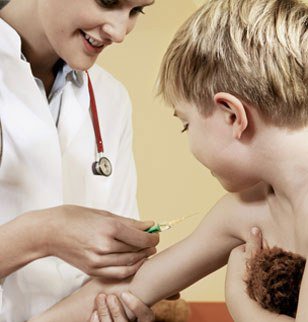- 1) I make the decision to get vaccinated
Vaccination against influenza A (H1 / N1) is a choice. It is not a compulsory vaccination. Today 750 000 people have already been vaccinated, tens of millions of French people have yet to decide. If you decide to get vaccinated it is surely to avoid putting your loved ones at risk, especially if you have in your entourage, children under 6 months. It is an "altruistic vaccine". You can ask your doctor for advice before you decide.
The majority of the population is still hesitant , but if you have made your choice, and want to get vaccinated, but you do not know how it goes: follow the guide!
- 2) I'm waiting for my turn and I consult the list of priority people
According to a schedule based on the priority level set by the Prime Minister, each person will receive a letter from the Health Insurance Minister of health, inviting him to be vaccinated. The priority persons are the health staff, the entourage of children under 6 months, the staff in charge of early childhood supervision, the subjects of 2 to 64 years at risk, the health carriers, hospitality managers in pharmacy and health centers ... The full list is available on the website of the Ministry of Health.
The so-called priority persons amount to 13,395 million French, the rest of the population must wait to receive their vaccination voucher. Just wait his turn! Each person will therefore receive a letter from Health Minister Roselyne Bachelot from Health Insurance, recognizable thanks to the "Stop influenza viruses" logo inviting him to be vaccinated. On the back of this letter is the vaccination voucher. This invitation specifies the address of the vaccination center closest to you and indicates the procedure to follow.
If there is an order to be respected it is because the vaccines are delivered as and when they are manufactured in pharmaceutical laboratories. The first doses are proposed for people at risk, who are most dange r by the influenza A virus
- 3) I get information for my children
For your darlings, it's just as simple, if not more. The vaccination campaign began for high school students on November 25, 2009, and will begin in early December 2009 for kindergarten and primary. The vaccination is spread over several weeks, it is not compulsory and it is decided by the families.
To decide to vaccinate the student, you must: have received a vaccination certificate and give your consent as a parent, whether the child is 2 or 18 years old.
Where will the child be vaccinated?
For the little ones, you have to go to a "public" vaccination center near your home. From the middle school, the vaccination takes place on the grounds of the school.
Is there a need to accompany him?
Parents must be present for kindergarten and primary school, but this is not necessary in middle school and high school.
What are the documents to provide to vaccinate your child?
For kindergartens and primaries, the vaccination certificate, the health card, the parental authorization and the individual form to be completed on site are required.
For middle and high school students, plan to give the school head your vaccination voucher and parental authorization, as well as the health card and the individual card to be given to the health care team.
- 4) I go to a vaccination center
Once done, you have about 10 days to go to a vaccination center yourself to receive the injection. You must go to the nearest vaccination center (a gym) with your invitation, your voucher, and your identity card.
Once there how is it going?
The first step is to complete a portion of the individual medical chart. This form is used to verify that you are fit to receive the vaccine, that there is no contraindication or allergy.
- The second step is an individual interview with the doctor, who will fill the other half of your individual medical record.
- The third step: the sting! The first dose of the vaccine is injected into your upper arm.
- The fourth and last step: you are given a certificate of vaccination, which you will have to bring back to the next vaccine.
Influenza vaccine A: practical questions
- Who's stinging?
Doctors, health staff, and interns, occupational physicians and the army health service.
- How long are we waiting?
From one to three hours, queues become longer and longer.
Volunteers are present at the entrance of the vaccination centers to guide you and inform you about the waiting time. In Seine-Maritime, the prefecture may have found a miracle cure: give the opportunity to citizens to make an appointment in advance via an Internet platform.
Is it effective? What are the risks ?
The vaccine takes 10 days to protect you, during this time you can still get sick. The first serious side effects were the appearance of Guillain-Barré syndrome . But the Afssaps, the French Agency for Health Safety of Health Products, in its first assessment of pharmacovigilance monitoring of influenza A vaccines, reports 36 reports of adverse effects: injection site reactions, headaches, fever and fatigue, malaise, increased blood pressure, which are mostly mild to moderate, with a rapid return to normal.
When to get vaccinated?
The 1080 centers in the territory do not have the same opening hours. Just go for a walk in your town hall, or on the website of your city. In general the hours vary between 9h-12h and 14h-19h but given the increasing attendance of vaccination centers President Nicolas Sarkozy wished "that the vaccination centers are open on Sunday." "The quality of the reception in the vaccination centers will have to be improved and better information will be given to the public on the functioning of the centers and the vaccines".


